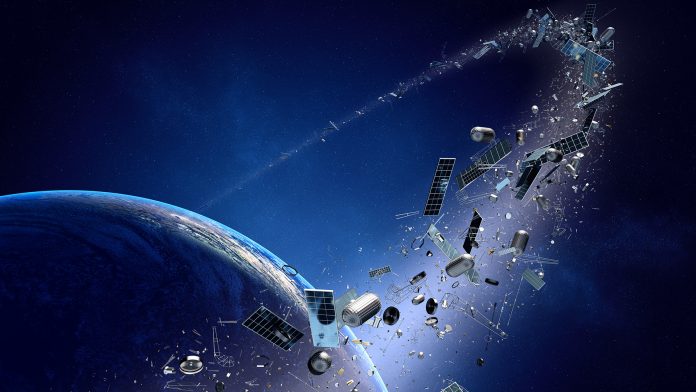The UK Space Agency is financing two UK-based companies – ClearSpace and Astroscale – £4m to tackle hazardous space junk.
The two companies have been awarded the funding to pioneer missions to remove existing pieces of space junk. Once the designs for the missions are complete, one of the projects will receive further funding, which could see the development of the first national space debris removal mission in the UK launched in 2026.
Both projects will create 70 new jobs, with the opportunity to further expand the UK space sector, which already supports 47,000 jobs, generating £16.5bn annually. The UK Space Agency is also developing a new Enabling Technology Programme (ETP) that will possess £15m to support space research and pioneer emerging space technologies in the UK.
Space junk – an astronomical problem
Space junk and orbital congestion are paramount challenges facing the space industry. Over the next three years, the UK Space Agency will provide £102m to innovate technologies to track and reduce space debris. Additionally, in line with the government’s National Space Strategy, the UK is leading regulations and standards globally to make space endeavours more sustainable.
Estimates suggest that there are over 130 million pieces of space junk orbiting Earth, ranging from small flecks of paint from spacecraft to old satellites, rocket bodies, and tools dropped by astronauts. Space debris can remain in orbit for hundreds of years, posing a danger to satellites and the public services that provide communications, navigation, and environmental monitoring.
Dr Paul Bate, Chief Executive of the UK Space Agency, said: “As our reliance on space technologies increases rapidly and the UK becomes a global hub of satellite design, manufacturing and launch, we are committed to leading efforts to make space more sustainable.
“With 1,700 satellites launched last year alone, the need to safeguard the space environment for the benefit of everyone on Earth has never been more pressing. By catalysing investment, backing innovative new technologies and supporting a national mission to remove space debris, we can keep space open for future generations and protect the important satellite services that modern life depends on.”
ClearSpace
The ClearSpace project is based in London and has been awarded £2.25m to study a mission that would remove derelict satellites from Low Earth orbit (LEO). The design phase of the project will last until October 2023, finishing with a preliminary design review. The Clearing the LEO Environment with Active Removal (CLEAR) mission will be essential for developing commercially viable space junk disposal and other in-orbit services.
Rory Holmes, ClearSpace UK Managing Director, said: “ClearSpace is honoured that the UK Space Agency is continuing their support to the CLEAR Mission. Space is getting more and more congested with defunct satellites, rocket bodies and other fragments – we have to act now to ensure this precious environment remains usable for future generations.
“The CLEAR Mission is a vital step on the path to making the removal of space debris a reality and will allow us to develop state-of-the-art space technologies, such as complex robotics and AI-based algorithms, within the UK. We cannot solve the challenge of space debris alone, and we are proud that nine cutting-edge UK-based space companies – Alden Legal, AstroAgency, Critical Software, Deimos, MDA, Orbit Fab, Satellite Applications Catapult, and University of Surrey – will work with us to address this issue.”
Astroscale
Astroscale Ltd., based at the Harwell Space Cluster in Oxfordshire, had been provided £1.7m to develop a satellite service to remove various retired or defunct satellites in a single mission. The Cleaning Outer Space Mission through Innovative Capture (COSMIC) mission will utilise Astroscale’s rendezvous and Remote Proximity Operations (RPO) and space junk capture abilities.
During the End-of-Life Services by Astroscale-demonstration (ELSA-d) satellite mission launched in 2021, Astroscale demonstrated the performance of its magnetic capture and RPO capability in orbit. The COSMIC servicer will be the technological successor of Astroscale’s Sunrise programme ELSA-M servicer – a multi-client debris removal space servicer scheduled to be launched before the UK’s Active Debris Removal mission in late 2024.
Nick Shave, Managing Director, Astroscale Ltd, commented: “We rely on space in so many areas of our lives, yet without the rapid development of the in-orbit servicing market, we cannot start removing the hazardous space debris that threatens our societal dependence on satellites.
“We are very pleased and honoured to have been selected by the UK Space Agency for this Active Debris Removal Mission Study award. Astroscale, working closely with expert UK partner companies, will design a national robotic capture capability that can safely remove two defunct UK-registered satellites in Low Earth Orbit. With our proven space mission heritage and strong industrial partnerships, we can deliver the UK government’s ambitious plans to develop a sustainable space economy for the benefit of future generations. Our goal is to make in-orbit debris removal and satellite servicing routine by 2030.”









